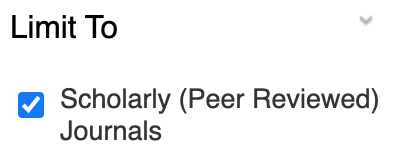“Scholarly” Sources
Requiring scholarly sources
In your classes at COCC, chances are good you’ll come across an assignment (if you haven’t already) that requires you to find and use scholarly sources. But what does that mean and why are instructors so insistent on these sources?
Scholarly sources are typically articles (though they could also be certain kinds of books) that are written by experts for other experts in the field. These experts are usually in conversation with each other: formulating and debating complex ideas, balancing competing perspectives, and frequently citing each other to build on previous work and advance the field. If you’ve ever read a scholarly article and felt like it was written in a language you don’t speak or that you’re interrupting a conversation that started without you, this is why!
So why the fuss about using these types of sources? Well, typically, when instructors say “scholarly” they mean peer reviewed or refereed. This is a rigorous review process that certifies someone who knows what they’re talking about has double-checked the work. It’s not a fact-checking process, but it ensures the author is following the best scientific practices of the field, contributing to the ongoing scholarly conversation, and meeting certain standards of quality before the work is published.
Peer-reviewed work isn’t perfect—there are flaws in any system! But peer-review is a standard in most academic fields, which means once an article has been through the peer review process, the rest of the field must deal with that work somehow. This can be done by incorporating that work into the established understanding of that discipline, building on it further, arguing with it to explain why it might be wrong, or trying to recreate results through replication studies.
Identifying Peer Review in the wild
So, if we know what peer review is and we know why we’d want to use it, how do we know if something goes through the peer review process? Well, just like with most things in college, they don’t make it easy on you! Unfortunately, there’s no label that brands peer reviewed articles, so adding peer review to your keywords is not a 100% accurate strategy.
Additionally, not all articles in an academic journal are subject to peer review. There may be other content such as letters, opinion pieces, and book reviews that have been edited, but not necessarily gone through a formal peer review process.
There are certain characteristics to look for when you want to know if something is peer reviewed. Click on the plus signs on the image below to learn more about what to look for on the article itself.
Using Library Resources to find scholarly sources
Did I mention this process was rigorous? It can take a long time from when the author conducts the research and writes the article to when peer reviewers critique it to when the article is ultimately published. The entire process can last a few years! Many times, publishers like to designate this work as exclusive by making access to journals and the articles within very costly. You might discover the perfect article, and then discover a $75 price tag to just rent the article for 24 hours.
Library resources are paid for by your tuition dollars. We provide access to these scholarly sources, so please don’t pay twice to access research! No matter where you find an article, if you’re asked to pay for it, contact the library instead. We’ll either be able to locate the article in our collections, or request it from another library.
 |
 |
 |
The other benefit to using library resources for scholarly research, is we make it a little easier to identify those peer-reviewed journals. When searching our tools, look for the filters that say Scholarly or Peer-reviewed. Applying these filters ensure your results will only come from peer-reviewed publications.
Activity

